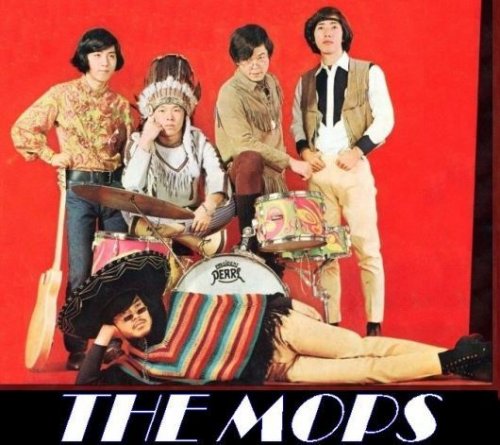
The Mops - Collection (1968-1994)
BAND/ARTIST: The Mops
- Title: Collection
- Year Of Release: 1968-1994
- Label: Victor, Express
- Genre: Garage Rock, Psychedelic Rock
- Quality: Flac (tracks, .cue, log)
- Total Time: 03:27:09
- Total Size: 1,2 Gb (scans)
- WebSite: Album Preview
Tracklist:
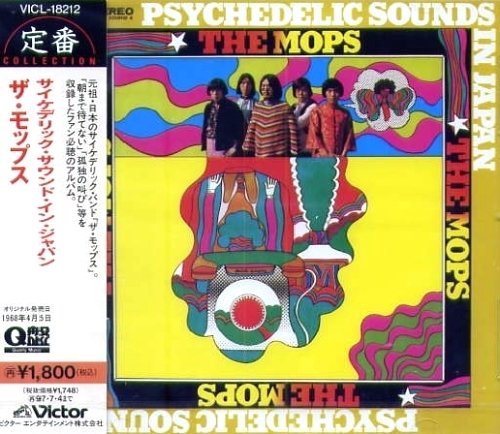
1968 - Psychedelic Sounds In Japan (Victor VICL-18212 Japan 1995):
01. Asamade Matenai
02. San Franciscan Nights
03. I Am Just A Mops
04. Inside Looking Out
05. The Letter
06. Somebody To Love
07. Bero Yo Isoge
08. White Rabbit
09. Asahi Yo Saraba
10. Light My Fire
11. Kienai Omoi
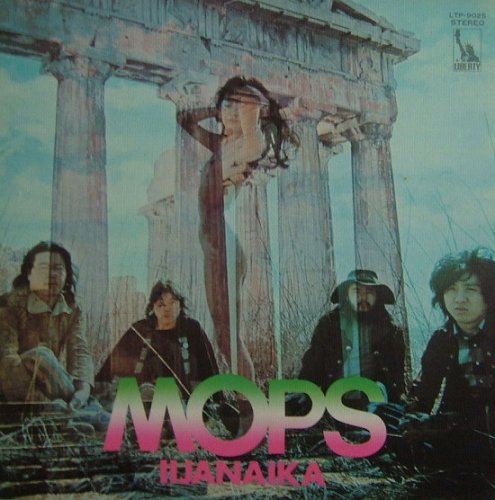
1971 - Iijanaika & Thunder Dance (Eastworld CT25-5580 Japan 1989):
01. Iijanaika
02. Town Where I Was Born
03. Good Morning, Good Afternoon, Good Night
04. Nobody Cares
05. Moonlight Mask
06. Traces Of Love
07. To My Sons (The Best Thing In Our Life Is Pain)
08. No One Knows What They Were
09. Alone
10. I Want To Hold Your Hand (Live)
11. Gimme Some Lovin' (Live)
12. To Love Somebody (Live)
13. New York 1963 - America 1968 (Live)
14. Moonlight Mask (Live)
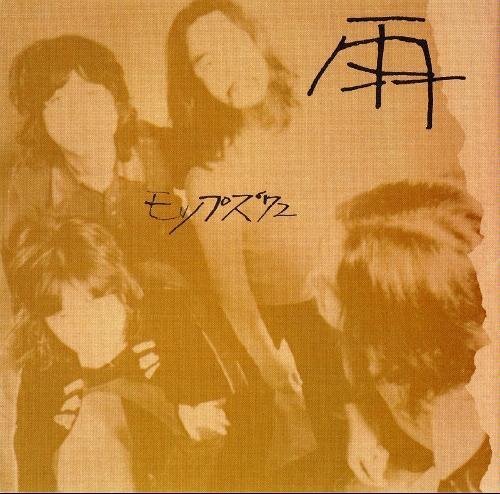
1972 - Rain (Toshiba TOCT-6605 Japan 1992):
01. Rain
02. Vivid Times
03. Gekko Kamen (Moonlight Mask)
04. Alone (Japanese Version)
05. Participation (Japanese Version)
06. Iijanaika (Japanese Version)
07. Nobody Cares (Japanese Version)
08. Wood of Sand
09. Thrive
10. That Is Not Which Is
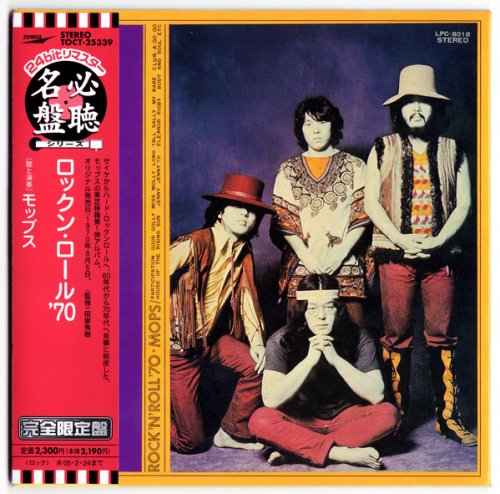
1994 - Rock 'n Roll '70 (Toshiba TOCT-8716 Japan):
01. Participation (English)
02. Rock 'n Roll ~ Good Golly Miss Molly ~ Long Tall Sally
03. My Babe
04. House Of The Rising Sun
05. Kyoko
06. I'm A Man
07. Jenny Jenny '70
08. Eleanor Rigby
09. Body And Soul
10. Get, Got, Gotten
11. Ain't That Just Like Me
12. Club A Go-Go

1968 - Psychedelic Sounds In Japan (Victor VICL-18212 Japan 1995):
01. Asamade Matenai
02. San Franciscan Nights
03. I Am Just A Mops
04. Inside Looking Out
05. The Letter
06. Somebody To Love
07. Bero Yo Isoge
08. White Rabbit
09. Asahi Yo Saraba
10. Light My Fire
11. Kienai Omoi

1971 - Iijanaika & Thunder Dance (Eastworld CT25-5580 Japan 1989):
01. Iijanaika
02. Town Where I Was Born
03. Good Morning, Good Afternoon, Good Night
04. Nobody Cares
05. Moonlight Mask
06. Traces Of Love
07. To My Sons (The Best Thing In Our Life Is Pain)
08. No One Knows What They Were
09. Alone
10. I Want To Hold Your Hand (Live)
11. Gimme Some Lovin' (Live)
12. To Love Somebody (Live)
13. New York 1963 - America 1968 (Live)
14. Moonlight Mask (Live)

1972 - Rain (Toshiba TOCT-6605 Japan 1992):
01. Rain
02. Vivid Times
03. Gekko Kamen (Moonlight Mask)
04. Alone (Japanese Version)
05. Participation (Japanese Version)
06. Iijanaika (Japanese Version)
07. Nobody Cares (Japanese Version)
08. Wood of Sand
09. Thrive
10. That Is Not Which Is

1994 - Rock 'n Roll '70 (Toshiba TOCT-8716 Japan):
01. Participation (English)
02. Rock 'n Roll ~ Good Golly Miss Molly ~ Long Tall Sally
03. My Babe
04. House Of The Rising Sun
05. Kyoko
06. I'm A Man
07. Jenny Jenny '70
08. Eleanor Rigby
09. Body And Soul
10. Get, Got, Gotten
11. Ain't That Just Like Me
12. Club A Go-Go
The Mops are one of Japan’s best know “group sounds” bands, particularly noted for their psychedelic period. The group was founded in 1966 by high school friends Mikiharu Suzuki (drums), Taro Miyuki (guitar), Masaru Hoshi (lead guitar) and Kaoru Murakami (bass), playing mostly instrumental rock ala the fabulously popular Ventures. Suzuki’s older brother Hiromitsu joined in later and became the group’s main vocalist, sharing the job with Hoshi.
The Mops started playing clubs and discos early on, but did not immediately distinguish themselves. In the summer of 1967 their manager visited San Francisco, and was very excited about the hippie movement that was booming there. He brought a copy of a Jefferson Airplane album back with him to Japan, which he impressed the Mops with. The band became enthusiastic about the new sounds, and singer Hiromitsu Suzuki especially became a big fan of Animals singer Eric Burdon. In what seems a fairly commercially driven decision, the Mops, prodded by their manager, became a “psychedelic band”, and signed with JVC Records. In November 1967 they released “Asamade Matenai”, which went to #38.
The Mops album of April 1968 Psychedelic Sound in Japan, was full of flower power flourishes, including cosmic artwork, ethnic clothing, fuzz guitars and sitar playing. It included covers of the Airplane’s hits “Someone To Love” and “White Rabbit”, the Doors' “Light My Fire”, the Animals' “San Franciscan Nights” and “Inside Looking Out”, as well as the Mops theme song “I Am Just A Mops” (which later became a cult favorite after being included on the obscurities album Nuggets 2). To complete the band’s hippie vibe, at their album release party they passed out banana peels to journalists.
Much was made of the band being Japan’s first psychedelic band, and they are sometimes credited as pioneering new studio effects, or at least introducing them to Japan. The band also performed with lighting effects, and sometimes blindfolded, supposedly to simulate the influence of drugs. Despite being widely considered a psychedelic band, their original songs were more garage band sounding. Also while most GS bands were playing love songs, the Mops had a song called “Blind Bird”, which contained the lyrics “please kill me”, which led to the song being left off some re-issues (but included on the obscurities collection Boulders #7). In 1969 Murakami quit the band and Miyuki took over bass duties.
After just one album with JVC, the group switched to Toshiba/EMI, where they changed their sound to more of a blues rock sound, it seems trying to change with the times. While not as warmly recalled, the band did moderately well after their psychedelic period. Their biggest hit was in 1971, “Gekko Kamen (Moonlight Mask)", which they recorded as a joke, but which became a novelty hit. Their hard rock number “Goiken Muyo (No Excuse)" charted in 1971, and the following year they did well with “Tadoritsuitara Itsumo Amefuri”, which was written for them by popular folk singer Takuro Yoshida. Before finally breaking up in May 1974, the Mops released a total of eight albums on Toshiba/EMI, a long career compared to most of the GS bands. Hoshi continued in the music business as an arranger, and Hiromitsu Suzuki became a TV “talento”. Mikiharu Suzuki today runs a major artist management company.
The Mops started playing clubs and discos early on, but did not immediately distinguish themselves. In the summer of 1967 their manager visited San Francisco, and was very excited about the hippie movement that was booming there. He brought a copy of a Jefferson Airplane album back with him to Japan, which he impressed the Mops with. The band became enthusiastic about the new sounds, and singer Hiromitsu Suzuki especially became a big fan of Animals singer Eric Burdon. In what seems a fairly commercially driven decision, the Mops, prodded by their manager, became a “psychedelic band”, and signed with JVC Records. In November 1967 they released “Asamade Matenai”, which went to #38.
The Mops album of April 1968 Psychedelic Sound in Japan, was full of flower power flourishes, including cosmic artwork, ethnic clothing, fuzz guitars and sitar playing. It included covers of the Airplane’s hits “Someone To Love” and “White Rabbit”, the Doors' “Light My Fire”, the Animals' “San Franciscan Nights” and “Inside Looking Out”, as well as the Mops theme song “I Am Just A Mops” (which later became a cult favorite after being included on the obscurities album Nuggets 2). To complete the band’s hippie vibe, at their album release party they passed out banana peels to journalists.
Much was made of the band being Japan’s first psychedelic band, and they are sometimes credited as pioneering new studio effects, or at least introducing them to Japan. The band also performed with lighting effects, and sometimes blindfolded, supposedly to simulate the influence of drugs. Despite being widely considered a psychedelic band, their original songs were more garage band sounding. Also while most GS bands were playing love songs, the Mops had a song called “Blind Bird”, which contained the lyrics “please kill me”, which led to the song being left off some re-issues (but included on the obscurities collection Boulders #7). In 1969 Murakami quit the band and Miyuki took over bass duties.
After just one album with JVC, the group switched to Toshiba/EMI, where they changed their sound to more of a blues rock sound, it seems trying to change with the times. While not as warmly recalled, the band did moderately well after their psychedelic period. Their biggest hit was in 1971, “Gekko Kamen (Moonlight Mask)", which they recorded as a joke, but which became a novelty hit. Their hard rock number “Goiken Muyo (No Excuse)" charted in 1971, and the following year they did well with “Tadoritsuitara Itsumo Amefuri”, which was written for them by popular folk singer Takuro Yoshida. Before finally breaking up in May 1974, the Mops released a total of eight albums on Toshiba/EMI, a long career compared to most of the GS bands. Hoshi continued in the music business as an arranger, and Hiromitsu Suzuki became a TV “talento”. Mikiharu Suzuki today runs a major artist management company.
Oldies | Rock | FLAC / APE | CD-Rip
As a ISRA.CLOUD's PREMIUM member you will have the following benefits:
- Unlimited high speed downloads
- Download directly without waiting time
- Unlimited parallel downloads
- Support for download accelerators
- No advertising
- Resume broken downloads


